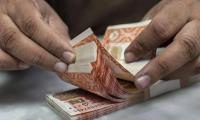KARACHI: Pakistan’s public debt rose 3.9 percent or Rs1.237 trillion to Rs33.023 trillion in the first month of the fiscal 2019/20 as the government continued to rely on domestic and external borrowings to meet its budgetary needs.
The State Bank of Pakistan (SBP) data showed total public debt stood at Rs31.786 trillion till the end of June 2019.
The government’s domestic debt rose 6.2 percent to Rs22.012 trillion. Foreign debt has been recorded at Rs11.011 trillion in July 2019, compared with Rs11.055 trillion in the previous month.
Analysts said the shortfall in tax revenue, increased interest payments incurred by the government due to monetary tightening and the rise in expenditures led to accumulation in the public debt.
However, external debt remained almost flat due to stable exchange rate and contraction in the current account deficit.
“This (increase in public debt) is not a positive sign at the start of a new fiscal year, showing weak public finances,” an analyst said.
“Public debt will remain high unless the government curbs budget deficit, increase tax collection and bring down uncontrollable expenditures.”
Analysts said loss-making public sector enterprises pushed the stocks of domestic debt.
Financial losses by state-owned airlines, steel mills and a huge circular debt of the power firms caused sizeable demand for the budgetary resources, they added.
The budget deficit jumped to a record high of 8.9 percent of gross domestic product in the last fiscal year, compared with 6.6 percent in the preceding year.
The fiscal deficit fell short of the government’s expectations mainly on the back of lower-than-expected FBR tax revenue collection, brokerage Topline Securities said in a analyst note.
“Interest expense as percentage of the tax revenues increased to an all-time high of 47 percent against 34 percent in FY18. Higher interest expenses are due to increase in the interest rates coupled with bank borrowings to finance fiscal slippages.”
The International Monetary Fund in its latest statement said Pakistan needs to mobilise domestic tax revenue to fund the much-needed social and development spending, while placing debt on a firm downward trend.
Pakistan Economic Survey for the fiscal year 2018/19 showed that over the medium-term, the government wants to bring and maintain its public debt-to-GDP and debt service-to-revenue ratios to sustainable levels through a combination of greater revenue mobilisation, rationalisation of current expenditure and efficient / productive utilisation of debt.
This handout photo released by the Iraqi prime minister´s office on April 1, 2023, shows a view of installations at...
P@SHA Chairman Zohaib Khan was the esteemed Chief Guest at Aptech 2023. — X/PASHAORGKARACHI: Muhammad Zohaib Khan,...
PSX marked the listing of the Mahaana Islamic Index Exchange Traded Fund with a gong ceremony on aPRIL 23, 2024. —...
FPCCI Regional Chairman and VP Zaki Aijaz while speaking during a round table discussion on the challenges and...
This representational image shows Gold bars. — AFP/FileKARACHI: Gold prices in the local market fell by Rs7,800 per...
Security personnel walk past the US Federal Reserve building in Washington, DC on Oct 22, 2021. — AFPNew York:...







